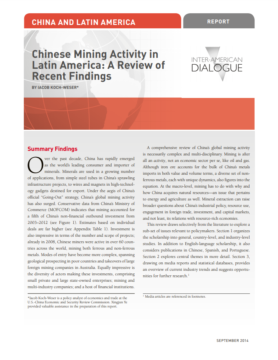The Politics Of Disaster Relief
After a 7.0 magnitude earthquake struck Haiti, the aftershock reached China in ways that few anticipated.The earthquake forced Chinese leaders to navigate the tricky politics of disaster relief.
In this interview with Radio Taiwan International, Asia and Latin America Program Director Margaret Myers considers the extent of US-China competition in Latin America, as well as Taiwan's prospects in the region, following Nicaragua's decision to sever diplomatic ties to Taiwan in December 2021.
[English translation below. Listen to the full interview here.]
"在过去的这几年里,中国对拉丁美洲和加勒比地区的贷款 – 尤其是政策性银行主权的贷款 --- 确实大幅度下降了,从2010年近400亿美元的高位降到了过去这两年几乎为零的数额。我认为,有几个原因可以解释这一现象。一方面,中国的政策性银行负责帮助中国公司在该地区建立初步业务。他们主要运用捆绑贷款的形式来助力中国公司筹备项目并在当地建立重要的关系网络。如今,既然中国公司已经能在拉美站稳脚跟,对政策性银行做牵头作用的需求也就降低了。另一方面,中国基于石油资源的贷款也给其政策银行带来了压力——特别要考虑到作为其主要贷款对象国的委内瑞拉所面临的经济恶化以及国际油价的剧烈波动。由此可见,虽然我们可能会在未来看到政策性银行提供一些额外的贷款,我预计这些贷款并不会达到我们过去在该地区看到的数十亿美元主权贷款的体量。尽管如此,我们确实能目睹中国在拉美的融资渠道显著增加,无论是中国的区域性私募股权基金,商业银行向中国和拉美公司提供的贷款,或是公司自身为内部广泛项目拨款的融资。"
"中美竞争无疑影响了该地区一些行业的成交情况。比如,在特朗普时期,智利与华为的海底电缆协议谈判就因美国介入而终止,其项目被转交给了一家日本公司。与美国关系密切的国家在与中国达成新协议时也变得更加谨慎了。但是在某些行业里,与中国的竞争即便不是毫无可能也极具挑战,科技行业便是这些领域其中之一。中国正以非常低成本的解决方案进入该地区,以此应这些地区在电信、电力传输、智能电网,还是监控技术等领域的可持续性、连通性与安全性的挑战。B3W在为中国金融和投资领域提供替代解决方案以及强调美国区域利益的方面肯定会产生一些影响。但是中国在这些领域的影响力也会持续增长。"
"台湾当然可以与美国达成合作,确定并共同资助一些拉丁美洲和加勒比国家的可融资项目,尤其是那些符合B3W以及其他美国倡议的项目。台湾和美国在发展援助方面有很多共同的观点和方法。并且美国的开发金融公司也一直在寻求合作伙伴的支持,以此实现共赢项目。"
"我认为台湾在CPTPP的成员身份在很大程度上取决于美国的成员身份以及/或者美国对台湾的强烈支持。但是此时此刻,美国在这个集团的影响力还是有限的,尤其是考虑到拜登不太可能希望美国参与到CPTPP中去。而且台湾将会难以获得TPP拉美成员国的支持,其中一些成员在很大程度上依赖中国的投资以及与其之间的贸易往来。"
"正如我们所知,RCEP并没有达到深入的地步,这是一个相对低级别的贸易协定。但是其成员在全球经济中仍占了非常重要的份额,无疑将巩固亚洲的供应链。从象征意义的角度,这对于中国也是一个很重要的成就。尤其是在看到RCEP和TPP几乎是在同一时间开始发展,而TPP遭遇了想当大的政治阻力的情况下。"
"海峡两岸的紧张局势当然是这一决定的主要动机。但中国与尼加拉瓜的关系由来已久。中国和尼加拉瓜历史上在许多问题上达成一致。 例如,尼加拉瓜支持中国的香港国家安全法,这是尼加拉瓜向中国寻求帮助的最佳时机。尼加瓜总统正在为他的国内议程寻求中国资金。我认为加强与曾经与美国关系密切但现在正在恶化的国家的关系也符合中国的国家利益,例如中国最近向墨西哥提出的广泛建议。"
"关于拉丁美洲的左翼复兴的程度还有待观察。很多人对伯里克想将智利带领的方向持乐观的态度,认为这是一个务实的方案。当然,其他新上任的领导人更加左倾。很难说明这对于与中国的关系来说意味着什么。中国也并不一定更倾向于左翼政府。但是左翼政府经常转向中国,通常是因为美国和国际金融组织并不支持他们的偏好和政策。我们很有可能会在秘鲁甚至洪都拉斯看到新的(中拉)交易,而那里甚至没有建立正式的外交关系。但是我们也有可能看到与右倾国家,甚至与那些政治关系紧张的国家达成交易。"
"Over the past few years, Chinese lending to Latin America and the Caribbean—particularly policy bank sovereign lending—has indeed fallen substantially, from a high of nearly $40 billion in 2010 to nothing in the past two years. I think there are several reasons for this development. On the one hand, Chinese policy banks have been responsible for helping Chinese companies establish initial operations in the region. They have often used tied loans to help Chinese companies win projects and build local networks of contacts. But now that Chinese companies have established a firm foothold in Latin America, there is less of a need for policy banks to take the lead. Additionally, China's oil-backed loans have caused some problems for the policy banks—especially in Venezuela. As a result, although we may eventually see the policy banks provide some new loans to LAC nations, I don't expect the sort of multi-billion dollar sovereign loans that we've seen in the region in the past. Nevertheless, we do see a significant increase in other sources of Chinese finance in Latin America, whether through Chinese and regional private equity funds, loans from commercial banks to Chinese and Latin American companies, or financing from the companies themselves for a wide range of projects."
"US-China competition has undoubtedly affected transactions in some industries in the region. During the Trump era, for example, negotiations over a submarine cable agreement between Chile and Huawei were terminated due to USm involvement, and the project was then awarded to a Japanese company. Countries close to the United States have also been more cautious about striking certain new deals with China. But there are some industries where competition with China is very challenging, if not impossible, and technology is one of those areas. China is entering the region with very low-cost solutions to address the region's sustainability, connectivity and security challenges, prioritizing areas such as telecommunications, power transmission, smart grids, and surveillance technology. B3W will certainly have some impact in terms of providing alternative solutions to Chinese finance and investment, as well underscoring US committment to the region. But China's influence in these areas will continue to grow."
"Taiwan can certainly work with the US to identify and co-finance some bankable projects in Latin American and Caribbean countries, especially those that align with B3W and other US initiatives. Taiwan and the US share many perspectives on and approaches to development assistance .And the US Development Finance Corporation is activity looking for partners to advance new projects."
"I think Taiwan's membership in the CPTPP largely depends on US membership and/or strong US support for Taiwan. But at this moment, US influence in this group is limited, especially given the fact that Biden is unlikely to want US involvement in the CPTPP. And Taiwan will struggle to garner support from the bloc's Latin American members, some of which rely heavily on Chinese investment and trade."
"As we know, the RCEP is a relatively low-level trade agreement. But its members still account for a very significant share of the global economy and will undoubtedly strengthen supply chains in Asia. Symbolically, this is also a very important achievement for China—especially given that RCEP and TPP started to develop at about the same time, and TPP encountered considerable political resistance."
"Tension across the Taiwan Strait was of course the main motivation for this decision. But China has had a long history with Nicaragua. China and Nicaragua have historically been on the same page on many issues. For example, Nicaragua supported China's National Security Law in Hong Kong. This is also an ideal time for Nicaragua to seek help from China. Nicaragua's president has turned to China to finance his controversial agenda. I think it's also in China's national interest to have stronger ties with countries that were once closely associated with the US but where ties have deteriorated somewhat."
"The extent of the left-wing revival in Latin America still remains to be seen. A lot of people are optimistic about the direction Boric wants to take Chile, viewing his agenda as exceedingly pragmatic. Of course, other new leaders are more left-leaning. It's hard to say what this means for relations with China. China doesn't necessarily gravitate toward toward left-wing governments. But left-wing governments often turn to China, usually because the US and international financial organizations don't support their preferences and policies. It is very likely that we will see new Chinese deals in Peru or even Honduras, where there are not even formal diplomatic relations. But it is also possible that we will see deals with right-leaning countries, even those among those that have tense political relations with China."
After a 7.0 magnitude earthquake struck Haiti, the aftershock reached China in ways that few anticipated.The earthquake forced Chinese leaders to navigate the tricky politics of disaster relief.
Despite reports in recent months that Mexican manufacturing is experiencing a resurgence, Mexico’s industrial sector faces tremendous challenges.
China has rapidly emerged as the world’s leading consumer and importer of minerals.

